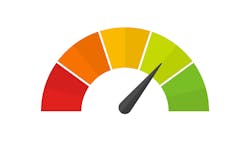Owning and operating a dental practice is far from leisurely work. Between navigating a busy schedule packed with patients, monitoring new technological trends in the field to remain competitive, and meeting the needs of dedicated clinical office assistants and other team members, it can be incredibly easy to lose sight of how your business is performing on a weekly or monthly basis—not to mention the value of your practice.
Regardless of limitations on time and resources, knowing the current value of your practice remains critical. By having this information on hand and being confident in its accuracy, you will immediately gain the ability to make smarter business decisions and more easily navigate a variety of situations, whether anticipated or unexpected.
You may also be interested in ... Thumbs down on using rules of thumb for practice valuation
To illustrate this more clearly, here's a closer look at three circumstances in which having an accurate practice valuation is critical, as well as additional considerations to keep in mind when seeking a professional, independent, and unbiased valuation.
Planning your exit strategy
Maybe you are planning to sell your dental practice in the next year or at some point within the next two to five years. Perhaps an unforeseen and uncontrollable event occurs and places you in a difficult financial position, forcing you to contemplate exiting the practice much earlier than you had originally planned. In any case, obtaining an independent and well-thought-out valuation of your practice is something you should do as quickly as possible before seeking a potential buyer.
For one thing, you need to be fully prepared to set a realistic asking price when the time comes to sell your practice. You’ll want that price to be informed by a comprehensive and accurate breakdown of your financial performance and future outlook. After working with an experienced, professional business appraiser, you’ll have a detailed overview of your practice’s financial position and performance along with projected earnings, all of which can help you adjust the time frame of the sale to secure the best price possible and ensure a successful outcome.
Your practice is the result of your life’s work, and there’s no reason to sell yourself short due to a lack of preparation or an incomplete, purely speculative valuation of your business.
When an associate wants to buy in
It’s not uncommon to want to expand your dental practice by taking on a new partner. Or an associate may approach you with an interest in buying a piece of your business. These can be incredibly strategic and lucrative decisions, but they can also be unbearably costly missteps if you haven’t sought out an unbiased, independent valuation.
At the end of the day, business is business. All parties involved in the transaction are going to want to make the best deal possible. When bringing on a new partner or selling off a portion of your practice, you’ll want the transaction to be grounded in fairness and based on a current and accurate valuation.
In short, by having all the necessary financial information when an offer arrives, you’ll have the best chance of protecting your financial interests and ensuring a fair, transparent process for the buyer.
Leveraging your valuation as a scorecard
One common misconception is that obtaining a current valuation is only useful or necessary as it relates to exiting the practice or selling off a part of the business. In reality, having an accurate valuation that includes a detailed overview of assets, liabilities, and individual performance of multiple business-critical processes can improve decision-making, boost efficiency, and ultimately increase your capacity to generate revenue and cash flow.
A valuation can be used as a type of “scorecard” with which to identify and evaluate how your decisions directly impact the performance of the business. For example, if you recently acquired new equipment or technology, increased the number of operatories, or made a string of new hires, you can get a better idea of how those investments are currently paying off, and then use that information to make any necessary adjustments. Are the additions you made generating a worthwhile return? How do your decisions more broadly impact your practice value? Do they drive it up or pull it down? These are all questions that can be answered by obtaining a comprehensive valuation. Further, you can leverage your valuation as a scorecard when you have a valuation performed every two to three years. This will provide regular accountability checkpoints on value as well as practice performance.
Additional considerations
Having a valuation can help you see how your practice might contribute to your relationship with financial institutions, allowing you to leverage your assets in a way that benefits your ability to obtain credit. More specifically, the value of your dental practice can potentially be used to secure lower interest rates or obtain more favorable terms from a lender.
For a valuation to be beneficial as it relates to any of these circumstances, the most important thing is to obtain a valuation that truly and completely captures the value of your practice. As a practice owner, be wary of valuations that rely on “rules of thumb,” which attempt to quickly generate an assessment of value but frequently fail to capture the full scope of the practice, potentially resulting in valuations that come in short to the tune of millions of dollars.
When obtaining a true, unbiased valuation, expect a careful process that considers all relevant aspects of the practice’s financial performance. For example, an experienced, qualified appraiser will likely send you a data request, which requires that you submit a variety of critical documents and information related to your business—including, but not limited to, detailed financial statements, tax returns, and a breakdown of historical revenues as well as long-term projections of future income and expenditures. This data request would be similar to the types of items a potential buyer would request. In fact, the buyer’s request list is likely to be more extensive than the appraiser’s data request. In some ways, the valuation can prepare you for what the sales process for your practice could look like.
Initially, many of our clients acknowledge they don’t know what their practice is worth, but they believe a valuation can give them a better understanding. They recognize that going through the valuation process will help prepare them for a potential sale, and they understand that being unprepared can negatively impact the transaction.
Editor's note: This article appeared in the November 2023 print edition Dental Economics magazine. Dentists in North America are eligible for a complimentary print subscription. Sign up here.
For more than 25 years, Tom Brooks, CPA/ABV, ASA, has handled valuation and litigation support matters for businesses of all sizes, from start-up companies to companies with more than $1 billion in revenues. He specializes in guiding clients with the valuation of their business, business interests, and intangible assets for mergers and acquisitions, estate planning, strategic planning, shareholder disputes, and commercial litigation. If you are interested in learning more about the potential value of your dental practice, email Tom at [email protected].
About the Author
Tom Brooks
For more than 25 years, Tom Brooks has handled valuation and litigation support matters for businesses of all sizes, from start-up companies to companies with more than $1 billion in revenues. He specializes in guiding clients with the valuation of their business, business interests, and intangible assets for mergers and acquisitions, estate planning, strategic planning, shareholder disputes, and commercial litigation. If you are interested in learning more about the potential value of your dental practice, email Tom at [email protected].
Updated October 3, 2023

